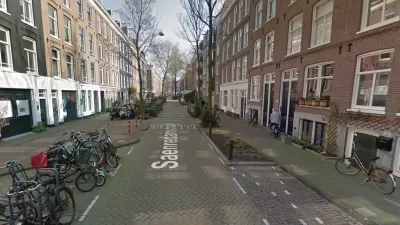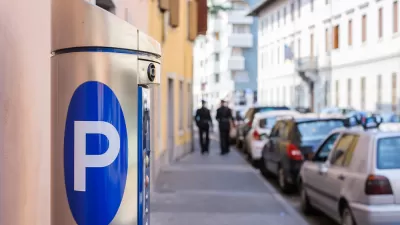Audi and Somerville will begin testing self-parking cars in 2018. Imagine the possibilities.
Tod Newcombe reports on the latest innovation in parking technology—cars that park themselves. The concept already has a test-bed in Massachusetts.
"The city of Somerville, Mass., and Audi, the German carmaker, have signed an agreement to not only create self-driving cars that park themselves but also build the infrastructure that such a technology would require (and allow). It could save the city as much as $100 million, according to Audi."
Newcombe describes the benefit of self-driving cars to parking three-fold: one, self-driving cars require less room to park, and thus can more cars can be shoe-horned into smaller spaces. "Second, parking garages would no longer have to be located downtown -- drivers and their passengers could exit the vehicles in the city and the cars would self-drive to the garages on the downtown’s periphery." And finally, all of the space and street capacity freed up by self-driving cars could then be used for bikes, pedestrians, transit, and real estate development.
More on how the Audi test will work in Somerville:
"The self-parking project, set to begin testing in 2018, will take place in an area known as Assembly Row, a former industrial district that the city hopes to transform into residences, offices, retail space, leisure amenities and a hotel. Currently, around 40 percent of the area within the Assembly Row project is dedicated to parking spaces. A garage that allows cars to self-park could save 26 percent of parking spaces for other uses, according to Audi, which calculates that each space is worth $25,000, or approximately $100 million in total savings by the time the project is completed in 2030."
FULL STORY: Can Cars That Park Themselves Reduce Traffic? Somerville, Mass., Will Find Out.

Study: Maui’s Plan to Convert Vacation Rentals to Long-Term Housing Could Cause Nearly $1 Billion Economic Loss
The plan would reduce visitor accommodation by 25,% resulting in 1,900 jobs lost.

North Texas Transit Leaders Tout Benefits of TOD for Growing Region
At a summit focused on transit-oriented development, policymakers discussed how North Texas’ expanded light rail system can serve as a tool for economic growth.

Why Should We Subsidize Public Transportation?
Many public transit agencies face financial stress due to rising costs, declining fare revenue, and declining subsidies. Transit advocates must provide a strong business case for increasing public transit funding.

How to Make US Trains Faster
Changes to boarding platforms and a switch to electric trains could improve U.S. passenger rail service without the added cost of high-speed rail.

Columbia’s Revitalized ‘Loop’ Is a Hub for Local Entrepreneurs
A focus on small businesses is helping a commercial corridor in Columbia, Missouri thrive.

Invasive Insect Threatens Minnesota’s Ash Forests
The Emerald Ash Borer is a rapidly spreading invasive pest threatening Minnesota’s ash trees, and homeowners are encouraged to plant diverse replacement species, avoid moving ash firewood, and monitor for signs of infestation.
Urban Design for Planners 1: Software Tools
This six-course series explores essential urban design concepts using open source software and equips planners with the tools they need to participate fully in the urban design process.
Planning for Universal Design
Learn the tools for implementing Universal Design in planning regulations.
Ascent Environmental
Borough of Carlisle
Institute for Housing and Urban Development Studies (IHS)
City of Grandview
Harvard GSD Executive Education
Toledo-Lucas County Plan Commissions
Salt Lake City
NYU Wagner Graduate School of Public Service





























